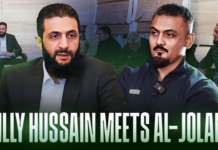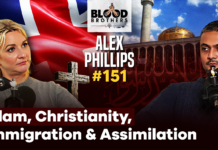
Dilly Hussain interviews a British born man who said his family has been “destroyed” after him and his three sons were stripped of their UK citizenship for alleged links to terrorism.
In light of the ongoing debate over Home Secretary Theresa May’s new Counter-Terrorism and Security Bill, the “severe” threat level to the UK from international terrorism, which she announced in August, has given her proposal a level of legitimacy. As the fear of returning British fighters increased, Prime Minister David Cameron suggested that the UK Border Agency (UKBA) and police should be granted new powers to deal with jihadists returning from Syria. Some elements of his proposition, such as the confiscation of passports and the revoking of citizenship, faced legal and political opposition as it could render Britons ‘stateless’.
However, when the UK joined the US-led coalition in bombing Islamic State militants in Iraq, the ‘terror threat’ had become a reality, albeit a relatively unlikely one. Consequently, May’s proposed counter-terrorism measures, aspects of which were initially scrutinised, could now be justified.
Speaking to me from Pakistan via Skype, a British-born man claims his family are victims of the UK’s secret courts, after he and his three sons were stripped of their citizenship in 2011 for alleged links to Al Qaeda and a banned Pakistani terror group. The Newcastle-born father said the terrorism-linked charges filed against him and his sons, who were also born in Britain, has “destroyed” his family.
The British government has issued an order that stops the father and his children from being named, after a legal case to restore their citizenship was rejected by the Special Immigration Appeals Commission (SIAC). Therefore, the man is referred to in this article as “S1”, as he was in the SIAC case. According to private documents that were forwarded to me, the 51-year-old father and his three sons, all in their twenties, are indicted of being “committed Islamist extremist(s)” with “ties to al-Qaeda and the proscribed organisation, Lashkar-e-Taiba (LeT)”.
Deprivation order
They are the first British-born family to be communally stripped of their citizenship, and are amongst 27 whose UK nationality has been revoked since May came to office as home secretary in 2010. Only five of those, including the family of four, are British-born, whilst the other 22 were born abroad.
Subscribe to our newsletter and stay updated on the latest news and updates from around the Muslim world!
S1 said there was no doubt that both he and his children considered themselves ‘British’. “We are through and through British in culture and values. English was and still is the only language we speak at home. We are more British than Pakistani,” he said. After being rejected on numerous occasions, they were eventually granted Pakistani citizenship, but claimed they felt like foreigners in Pakistan and “longed to return home”. “It’s an absurd case against us. Neither me nor my sons are linked to any of these groups, and there is no evidence to prove these claims. Basically they are guilty for being my sons. If my fourth son was 18 at the time his citizenship would have been revoked too,” the father told me.
S1 and his sons’ citizenship were revoked under the British Nationality Act 1981 while they were in Pakistan. They realised their fate when four letters sent to their previous address in Stockport, Greater Manchester, were redirected to their residence in Pakistan. The “deprivation of citizenship” letters were dated March 2011 and signed by the home secretary. Theresa May explained in the letter that the four family members had their citizenship revoked “because I am satisfied that it would be conducive to the public good” and that they would not be left “stateless” because they were eligible for Pakistani citizenship.

Regarding the questionable manner in which Britons are stripped of their citizenship, Legal Director at human rights organisation, Reprieve, Kat Craig told me: “The regressive nature of these measures is clear from the company their supporters keep: the UK has been praised by the far right French Front National for these provisions, whilst the US Supreme Court has called similar measures “a form of punishment more primitive than torture.
“In the past, the UK has deprived people of their citizenship shortly before they were kidnapped, tortured and rendered – and in some cases killed in US drone strikes.”
Secret Courts
The home secretary said her decision was based on a review by the MI5 and the secret services that S1 and his sons, ‘T1’, ‘U1’ and ‘V1’ were all connected to Al Qaeda and LeT.
“My decision has been taken in part reliance on information which, in my opinion, should not be made public in the interests of national security and because disclosure would be contrary to the public interest,” she stated in the letter.
The use of May’s power to strip Britons of their citizenship without due process has increased because of the alleged terror threat posed by British fighters returning from Syria, and seems to specifically target Muslims according to one advocacy group.
Media officer for CAGE, Amandla Thomas-Johnson, told me: “Citizenship stripping has been gathering pace at an alarming rate under the coalition, with Theresa May responsible for 27 alone since 2010. As with previous cases, the decision to revoke the citizenship of ‘S1’ and his three sons is almost impossible to challenge and leaves them in a legal black hole similar to a medieval exile.

“This power has almost exclusively been used against Muslims and such decisions will confirm to many that British Muslims are second class citizens in the eyes of the government.”
S1 mentioned that while his wife and his 18-year-old disabled son still had British citizenship, they did not want to leave the family by returning to the UK.
He said: “My youngest son desperately wants to come back. He is 18 with a mind of a six year old. In Pakistan people with disabilities are shunned. He misses his school in Stockport and has medical needs which are not being met here.
“My wife is diabetic and also requires medical care. She can’t walk properly and was due for a knee operation in the UK. On top of that she is suffering from stress, anxiety, depression and now has liver problems.”
The father is appealing against the SIAC decision at the Court of Appeal, but was worried that the case would take a long time to settle. “I could be in the grave until my case reaches the Supreme Court or the European Court of Human Rights. This has destroyed our family and has taken a suffocating toll on us. Until then our lives are on hold and my family continues to suffer,” he said.
The SIAC judgment in December 2012 recognised the difficulty endured by the family. “The deprivation decision and order in the case of S1 has undoubtedly had an impact on the private and family life of his wife and youngest son, both of whom remain British citizens,” stated Mr Justice Mitting in his verdict. However, he said due to the “threat to national security” posed by S1, “the unavoidable impact upon the rights of his wife and youngest son would be justifiable”.
S1 and his sons were not able to attend the SIAC hearing to be informed of the charges against them. SIAC cases and rulings are not normally held in public to protect the secret testimony given by the security services.

When I asked Rachel Robinson, Policy Officer for human rights group Liberty about the secretive nature of SIAC, she said: “Having stripped someone of their citizenship, the home secretary can relegate any appeal to the Special Immigration Appeals Commission. This secretive body has the power to exclude an appellant from their own hearing and allow evidence to be heard in private.
“How can someone defend themselves when they can’t see the evidence against them? Our law allows the government to strip suspects – including those born and raised in Britain – of citizenship without telling them why.”
Message to Theresa May
The father said that the assertions that he and his sons were connected to Al Qaeda and LeT were “pathetic because the two groups are ideologically opposed – you can’t be a member or affiliated to both organisations. When I read the allegations in the deprivation order, my heart sank and I thought to myself ‘what a joke’.”
S1 added that even after being stripped of his citizenship, he still considered himself British and loyal to the country of his birth. He advised British Muslims to be “ambassadors of Islam even when their religion is under attack. We have to be engaged in our communities. There are so many common values between Muslims and non-Muslims, that we shouldn’t be condemning them to the hellfire rather saving them from it.”

I asked the father if he wanted to get a message across to the home secretary. He said: “Laws such as those that have facilitated the deprivation of our citizenship is something expected from despotic tyrannical regimes, not a country which claims to be built upon justice and due process.
“At the very least, I am entitled to a hearing in front of a judge where evidence is presented and I am given the opportunity to respond to the allegations against me and my sons.”
Over the past year, the general public and human rights groups have questioned the overwhelming power the home secretary possesses in single-handedly stripping Britons of their citizenship via secret court hearings. Kat Craig of Reprieve concluded: “This government has shown that it is willing to trample over its citizens’ most basic rights in this latest iteration of poorly conceived attempts to combat terrorism. The fact that a single politician, without the consent of the court, now has the power to secretly make a British national stateless is nothing short of chilling.
“Theresa May has shown that she is not shy in using – and indeed abusing – this power: the government has recently acknowledged that in at least one case they intentionally waited until the victim was abroad before stripping them of their citizenship. In doing so, May not only deprived them of the rights they are afforded as a British national, but also of their rights – however meagre – to appeal the decision to the secretive Special Immigration Appeal Commission.”
This article is an elaboration of a feature Dilly Hussain wrote for Al Jazeera English. You can read it here.



















